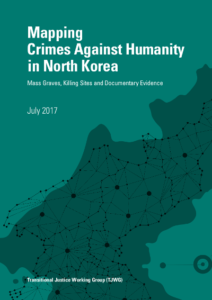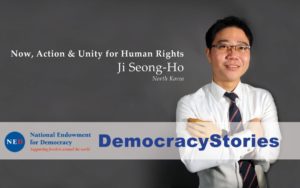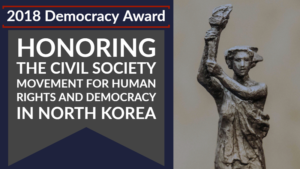 The No. 1 topic at Tuesday’s summit between President Trump and North Korea’s Kim Jong Un will undoubtedly be the reclusive regime’s nuclear weapons, the Los Angeles Times reports:
The No. 1 topic at Tuesday’s summit between President Trump and North Korea’s Kim Jong Un will undoubtedly be the reclusive regime’s nuclear weapons, the Los Angeles Times reports:
That’s left analysts worried that North Korea’s terrible history of human rights abuses will be completely sidelined by security concerns. Tens of thousands of people accused of political crimes are in North Korea’s vast gulag of work camps and prisons,  according to Amnesty International. Other human rights groups, such as the Transitional Justice Working Group* in Seoul, have documented mass gravesites.
according to Amnesty International. Other human rights groups, such as the Transitional Justice Working Group* in Seoul, have documented mass gravesites.
But two administration officials tell NBC News the U.S. has decided not to bring up human rights at the summit.
Experts and activists who focus on human rights in North Korea say a phased approach – seeking human rights concessions after a nuclear deal is consummated – is a big mistake, for strategic as well as moral reasons, NBC adds:
 On a practical level, they argue, verification of any nuclear deal would rely on international inspections. With that in mind, they say, the U.S. and its allies will never be able to substantiate North Korean claims to have given up its nuclear weapons; under a totalitarian regime like Kim Jong Un’s, anyone who might talk to international nuclear inspectors can be dragged off to prison camps.
On a practical level, they argue, verification of any nuclear deal would rely on international inspections. With that in mind, they say, the U.S. and its allies will never be able to substantiate North Korean claims to have given up its nuclear weapons; under a totalitarian regime like Kim Jong Un’s, anyone who might talk to international nuclear inspectors can be dragged off to prison camps.
Ahead of Tuesday’s summit, several high-profile defectors, who escaped the regime’s rights abuses and repression, are considering a question that until recently seemed foolish to ask: Could they one day return home? They shared their stories of imprisonment, torture and suffering with the Washington Post.
 “I still don’t know what exactly I will be doing when [reunification] comes, but I will be helping North Korean people to settle well into democracy and freedom,” said Ji Seong-ho, 36, who leads a Seoul-based group called Now Action and Unity for Human Rights, whose funding is covered by groups that include the National Endowment for Democracy.
“I still don’t know what exactly I will be doing when [reunification] comes, but I will be helping North Korean people to settle well into democracy and freedom,” said Ji Seong-ho, 36, who leads a Seoul-based group called Now Action and Unity for Human Rights, whose funding is covered by groups that include the National Endowment for Democracy.
Kim and his regime are inseparable from their atrocities. It’s questionable whether he could survive in power without them. And how could North Korea open to the world and to foreign investors — how could the United States sign a peace treaty with it — while  those camps continue to function? Jackson Diehl writes for the Washington Post:
those camps continue to function? Jackson Diehl writes for the Washington Post:
“While past negotiations with the North may have privileged the security issues at the expense of human rights . . . the two issues are today intimately tied in unprecedented ways,” concluded a 2016 study on North Korea strategy by Robert Gallucci, a former negotiator with Pyongyang, and Victor Cha, who was Trump’s first choice for ambassador to South Korea. The two pointed out that practices such as forced labor and severe food rationing “favor the regime and its proliferation practices” by providing resources and suppressing dissent.
A 400-page United Nation Commission of Inquiry report released in 2014declared the  “gravity, scale and nature of these violations reveal a state that does not have any parallel in the contemporary world.” Here are the crimes the U.N. commission claimed it found, CBS News adds:
“gravity, scale and nature of these violations reveal a state that does not have any parallel in the contemporary world.” Here are the crimes the U.N. commission claimed it found, CBS News adds:
- Extermination
- Murder
- Enslavement
- Torture
- Imprisonment
- Rape
- Forced abortions
- Other sexual violence
 Persecution on political, religious, racial and gender grounds
Persecution on political, religious, racial and gender grounds- The “forcible transfer of populations”
- The “enforced disappearance of persons and the inhuman act of knowingly causing prolonged starvation”
Some observers believe any deal with the Hermit State must include consideration of the regime’s egregious human rights violations.
“To achieve lasting peace in the region, we must demand that North Korea not only surrender its nuclear weapons. It must also cease its human rights abuses,” said Sen. Orrin Hatch.
“To be accepted by the international community, North Korea must first dismantle its labor camp system – a corrupt organ of state-sponsored torture that has claimed hundreds of thousands of lives,” he added. “Once sent to these camps, inmates are subject to starvation, torture, sexual violence, forced abortions and even murder.”
 Join a timely discussion of recent developments featuring the insights of key policy makers and experts in U.S. – DPRK relations, as well as the recipients of NED’s 2018 Democracy Award. These activists will discuss how exposure to and engagement with the outside world is changing North Korea from the inside, and what that change means for the future of North Korea and its people.
Join a timely discussion of recent developments featuring the insights of key policy makers and experts in U.S. – DPRK relations, as well as the recipients of NED’s 2018 Democracy Award. These activists will discuss how exposure to and engagement with the outside world is changing North Korea from the inside, and what that change means for the future of North Korea and its people.
The National Endowment for Democracy
invites you to a half-day meeting:
Beyond Pyongyang: Connecting with the People of North Korea
Wednesday, June 13, 2018 – 8:30 a.m.–12:00 p.m.
featuring remarks by
Senator Ed Markey (D-MA), Ranking Member, Senate Foreign Relations Subcommittee on East Asia, the Pacific, and International Cybersecurity Policy
 Panel I – Assessing the Current Situation in North Korea
Panel I – Assessing the Current Situation in North Korea
• Amb. Mark Lippert, Boeing, former U.S. Ambassador to South Korea
- Jung Pak, Brookings Institutuion
• Roberta Cohen, U.S. Committee for Human Rights in North Korea
• Michael J. Green, CSIS; Walsh School of Foreign Service, Georgetown University
 Panel II – Information, Advocacy, and Defectors: The Role of Civil Society
Panel II – Information, Advocacy, and Defectors: The Role of Civil Society
Moderator: Josh Rogin, The Washington Post
Featuring the recipients of NED’s 2018 Democracy Award
• Sungju Lee, Citizens’ Alliance for North Korean Human Rights
• Shi-woo Choi, Now, Action & Unity for Human Rights (NAUH)
• Kwang Baek Lee, Unification Media Group
• Hubert Younghwan Lee, Transitional Justice Working Group* (TJWG)
1025 F Street, N.W., Suite 800, Washington, D.C. 20004







